Secure Your Online Privacy with a Reliable VPN
Did you know over 80% of internet users in the United States worry about their online privacy? In today’s digital world, keeping your personal info safe is key. As a professional copywriting journalist, I’m here to share how a Virtual Private Network (VPN) can help protect you online.
In this article, we’ll explore VPNs. We’ll talk about what they are, why you need one, and how they keep your digital life safe. Whether you’re browsing, streaming, or accessing sensitive info, a good VPN is essential for a secure online experience.
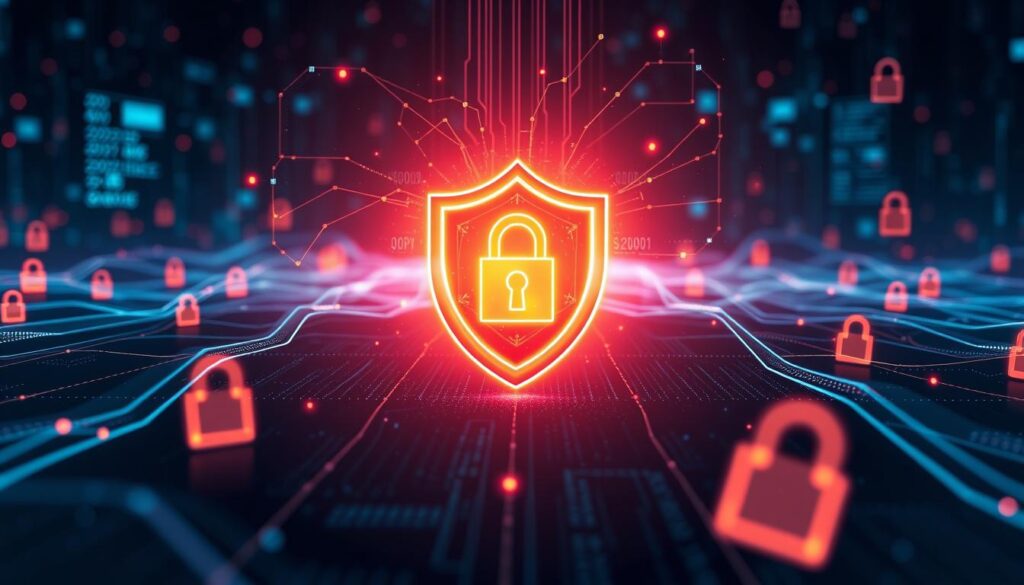
Key Takeaways
- Over 80% of US internet users are concerned about their online privacy
- VPNs provide enhanced security, anonymity, and unrestricted access to online content
- Discover the benefits of using a VPN for secure browsing, data encryption, and bypassing geo-restrictions
- Learn how to choose the right VPN provider and set up a VPN for your online needs
- Understand the risks of not using a VPN and the importance of protecting your digital privacy
What is a VPN and Why Do You Need One?
In today’s digital world, keeping your online activities private and secure is key. A virtual private network (VPN) is a powerful tool for this. But what is a VPN, and why should you use one?
Understanding Virtual Private Networks
A VPN creates a secure, encrypted link between your device and the internet. It makes your internet traffic go through a remote server. This hides your real IP address and encrypts your online actions. It’s hard for anyone to track your online behavior or get to your sensitive info.
Reasons to Use a VPN
There are many good reasons to use a VPN:
- Improved online privacy – A VPN keeps your internet activities private, protecting your data.
- Enhanced internet security – It encrypts your internet traffic, keeping your info safe from unauthorized access.
- Bypassing geo-restrictions – A VPN lets you get around censorship and access blocked content, giving you free internet access.
- Anonymous browsing – It hides your IP address and encrypts your traffic, making your browsing anonymous and protecting your data.
If you care about online privacy, want to get past content restrictions, or just want a safer internet, a VPN is a great choice.
Protecting Your Online Privacy with a VPN
Using a virtual private network (VPN) is a top way to keep your online privacy safe. A VPN creates a secure tunnel around your internet traffic. It hides your IP address, keeping your online actions private and safe.
A VPN keeps your IP address hidden. This means your ISP, government, or anyone else can’t track what you do online. This is very important when you’re using public Wi-Fi, which can be risky.
Also, a VPN encrypts your internet traffic. This protects your personal info, like passwords and financial details, from hackers. This data protection is key for keeping your online privacy and internet security strong.
With a VPN, you can browse the web anonymously. Your real location and identity are hidden. This is great for getting around geo-restrictions or censorship, letting you access blocked content.
“A VPN is a must-have tool for anyone who values their online privacy and security.”
Choosing a reliable VPN helps you control your cybersecurity. It keeps your sensitive data and online actions safe from unwanted eyes. It’s a vital part of keeping your digital privacy in today’s world.
Encrypting Your Internet Traffic
Encryption is key to keeping your online activities safe. Encryption turns your data into a secret code. Only those with the right keys can read it. This makes sure your internet traffic stays private, even if someone tries to intercept it.
The Importance of Encryption
In today’s world, where hackers and governments watch our online moves, encryption is vital. It keeps your internet security and online privacy strong. With encryption, your personal info, like passwords and financial details, stays safe from harm.
Types of Encryption Used by VPNs
Using a VPN means your internet traffic goes through a secure tunnel. This tunnel is made possible by encryption protocols that VPNs use. Some top encryption protocols include:
- AES (Advanced Encryption Standard) – A top choice for its strong security.
- OpenVPN – Known for its balance of security and speed.
- IPsec (Internet Protocol Security) – A set of protocols for secure IP networks, often paired with VPNs.
- WireGuard – A fast and efficient encryption protocol that’s becoming popular.
These encryption methods make sure your internet traffic stays safe. They protect it from unauthorized access, boosting your cybersecurity and online privacy.
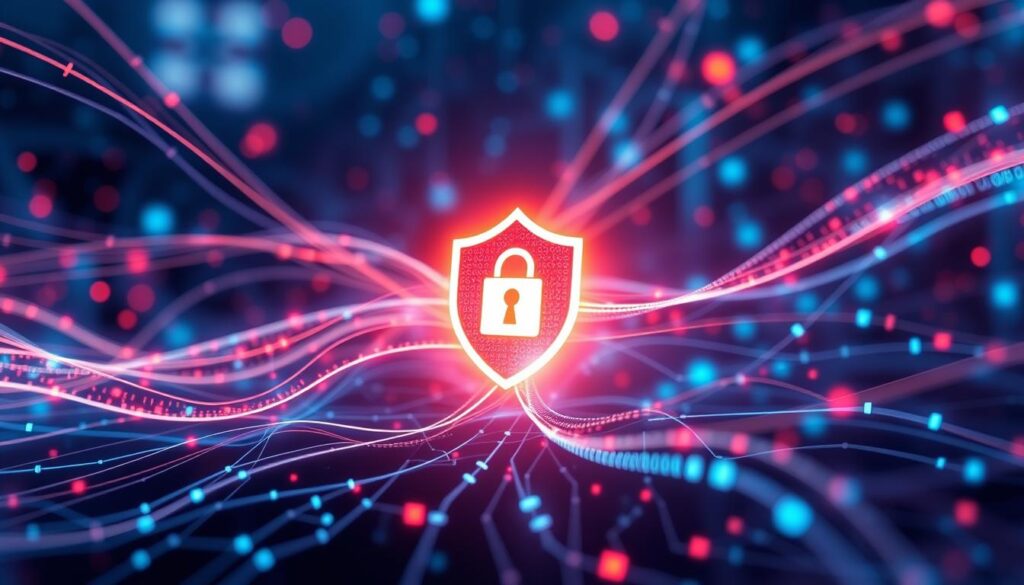
“Encryption is the foundation of online security and privacy. Without it, our digital lives would be an open book for anyone to read.”
Bypassing Geo-Restrictions and Censorship
Using a VPN is great for getting around geo-restrictions and censorship. It lets you access websites and streaming services blocked in your area. This is super helpful for those who want more internet freedom and to unblock content.
Accessing Blocked Content
Many governments and groups block certain websites online. A VPN helps you bypass censorship and geo-unblocking. This way, you can see content from anywhere, which is great for staying informed and exploring new ideas.
- Bypass geo-restrictions and access content from around the world
- Unlock streaming services, online games, and other restricted platforms
- Circumvent censorship and stay informed, even in regions with strict internet controls
With a good VPN, you can freely explore the internet. It lets you access the content you want, no matter where you are or what restrictions there are.
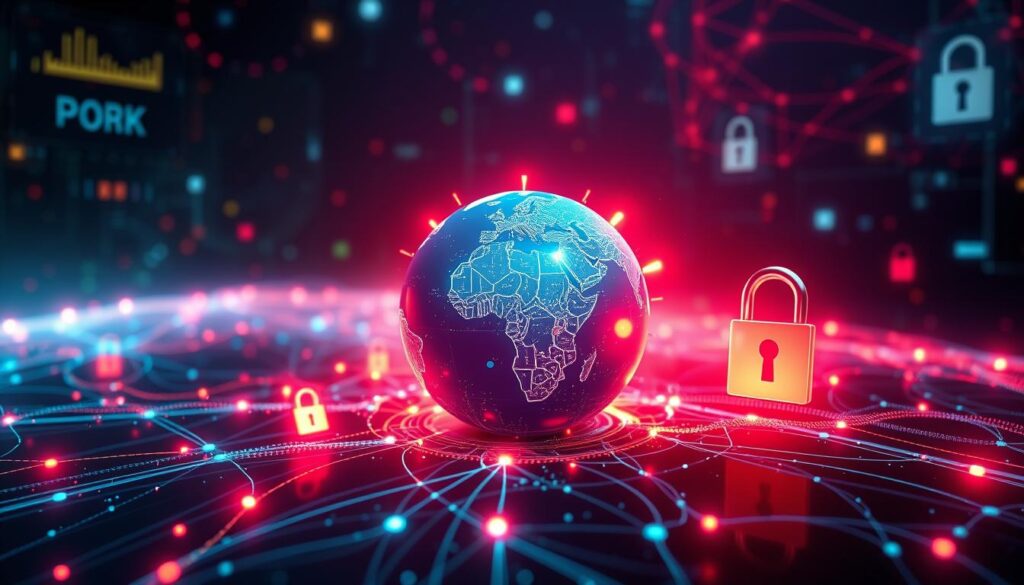
“A VPN is a must-have tool for anyone who values their online privacy and freedom.”
Choosing the Right VPN Provider
Protecting your online privacy and security starts with picking the right VPN provider. With many choices, finding the right VPN can be tough. I’ll guide you through the key factors to consider for a reliable VPN provider to keep your online privacy and internet security safe.
Factors to Consider When Selecting a VPN
To pick the best VPN for you, look at these important factors:
- Logging Policy: Choose a VPN with a strict no-logs policy. This ensures your data protection and anonymous browsing are not tracked.
- Server Locations: A large network of server locations lets you access content worldwide. It also helps you bypass geo-restrictions.
- Connection Speed: Opt for a VPN with fast and reliable speeds. This ensures a smooth browsing experience without losing performance.
- Customer Support: Good customer support is key. It helps with any issues or questions about using the VPN.
- Encryption Protocols: Make sure the VPN uses strong encryption protocols like OpenVPN and AES-256. These protect your internet traffic and keep your online activities secure.
By considering these factors, you can choose a VPN provider that meets your privacy and security needs.
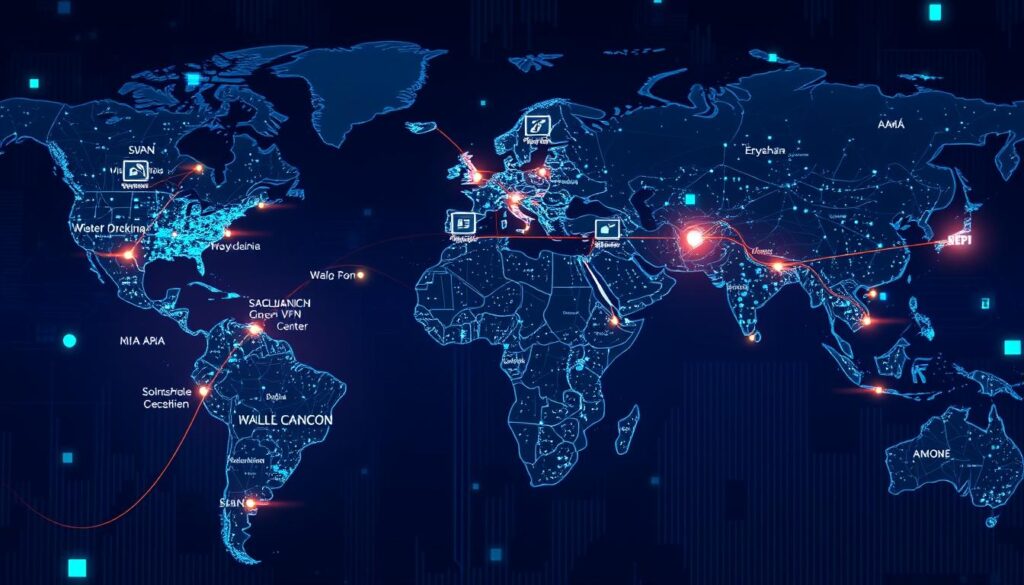
“Choosing the right VPN provider is essential for protecting your online privacy and security. Don’t settle for anything less than a reliable service that prioritizes your digital safety.”
Setting Up and Using a VPN
Starting with a [vpn] is easy. I’ll show you how to set it up on your devices. This includes desktops, laptops, smartphones, and tablets. We’ll go over installing, connecting, and tweaking your [vpn] settings for better [online privacy] and [internet security].
First, pick a trustworthy [vpn] provider. Look around and compare to find the right one for you. After choosing, download and install the app or client on your device.
- Open the [vpn] app and log in to your account.
- Find the list of [vpn] servers and pick one near you or for your needs.
- Hit the “Connect” button to start a secure [vpn] link.
- Adjust your [vpn] settings, like the protocol, for better [online privacy] and [internet security].
Now your [vpn] is ready and running. You can enjoy better [online privacy], [internet security], and access to [blocked content]. Always use your [vpn] on public Wi-Fi or when online to keep your [online privacy] safe.
“A [vpn] is an essential tool for anyone who values their [online privacy] and [internet security] in today’s digital world.”
Just follow these steps to [how to use vpn] on your devices. Start protecting your [online privacy] and [internet security] today.
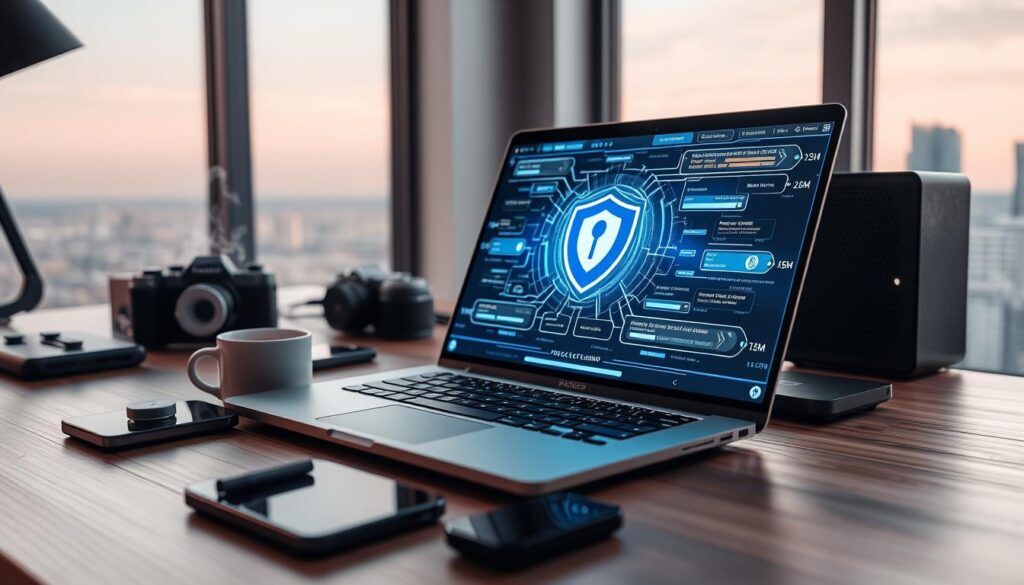
VPN Protocols and Their Differences
Choosing the right VPN protocol is key to your online security and speed. VPN providers offer many protocols, each with its own benefits. Knowing these differences helps you pick the best one for you.
Understanding VPN Protocols
VPN protocols are like rules for how your device talks to the VPN server. Common ones include OpenVPN, IKEv2, L2TP/IPsec, PPTP, and WireGuard. Each has its own strengths and weaknesses, based on security, speed, and device compatibility.
Choosing the Right Protocol for Your Needs
- For top security and encryption, OpenVPN and WireGuard are top picks. They offer strong encryption and security.
- If you want speed, IKEv2 and WireGuard are good choices. They’re fast and efficient.
- For using on many devices, L2TP/IPsec and PPTP are better. But they’re less secure than others.
When picking a VPN protocol, think about what you need. Consider security, speed, and device compatibility. Knowing each protocol’s strengths helps you choose the right one for your online safety and privacy.
| VPN Protocol | Security | Speed | Compatibility |
|---|---|---|---|
| OpenVPN | High | Moderate | Broad |
| IKEv2 | High | High | Moderate |
| L2TP/IPsec | Moderate | Moderate | Broad |
| PPTP | Low | High | Broad |
| WireGuard | High | High | Broad |
Understanding VPN protocols and choosing wisely can boost your online privacy, security, and internet experience. Whether you focus on speed, encryption, or compatibility, there’s a protocol for you.
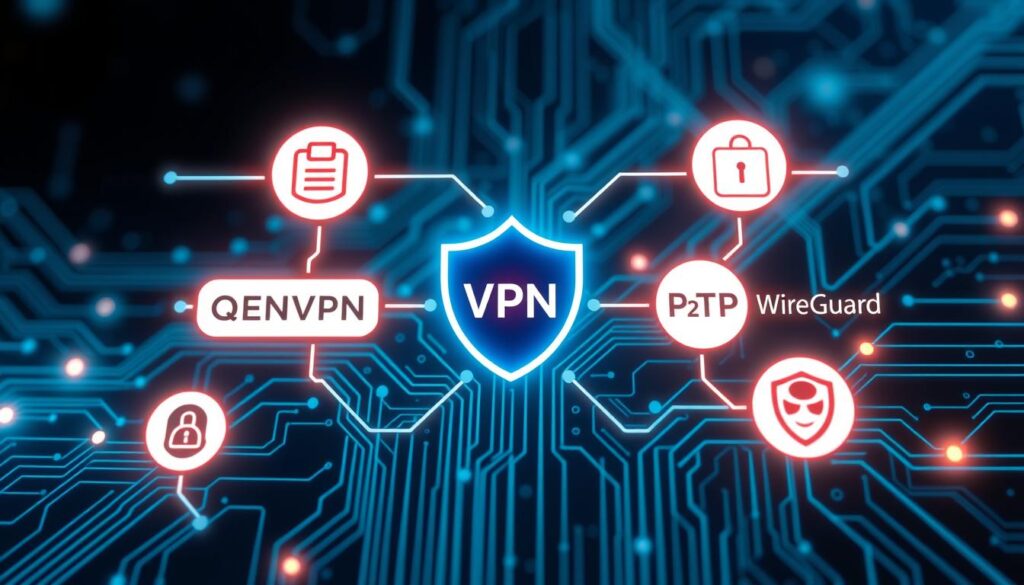
The Risks of Not Using a VPN
Not using a VPN can leave you open to many dangers. Without it, your online activities are not safe. You could face identity theft, data breaches, and even surveillance.
Potential Threats to Your Online Privacy
Without a VPN, hackers, internet providers, and governments can see your online traffic. They can get your login details, financial info, and personal messages. Cybercriminals might steal your identity, commit fraud, or demand ransom for your data.
- Identity Theft: Without a VPN, your online activities can be monitored, and your personal information can be stolen, leading to the possibility of identity theft.
- Data Breaches: Public Wi-Fi networks and unsecured connections can allow hackers to access your sensitive data, putting you at risk of data breaches.
- Surveillance: Government agencies and internet service providers can potentially monitor your online activities without the added protection of a VPN, compromising your online privacy.
The dangers of not using a VPN are real and serious. Not securing your internet connection makes you vulnerable to many cybersecurity threats. These threats can harm your data protection and online safety.
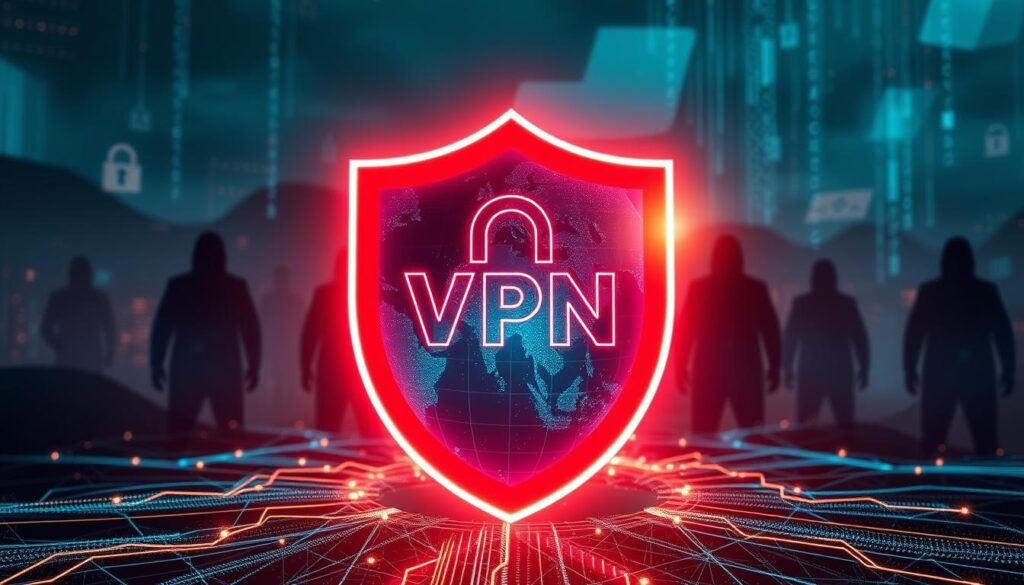
“Cybercriminals are becoming more sophisticated, and without the protection of a VPN, your online activities are an open book for them to exploit.”
VPN for Remote Access and Work
The COVID-19 pandemic has made remote work essential for businesses and individuals. Securing our online activities and protecting sensitive information is now more crucial than ever. A VPN, or Virtual Private Network, is a key tool for remote access and work.
A VPN creates a secure, encrypted link between your device and the company’s network. This lets you access internal resources and sensitive data safely. It’s especially important for remote workers, as it protects your internet security and data protection while working from home or on the move.
- Secure Remote Access: A VPN lets you connect securely to your company’s network. This ensures your remote access to critical resources is safe from unauthorized access.
- Compliance and Regulatory Requirements: Many industries have strict rules for data handling and cybersecurity. A VPN helps you meet these requirements by providing a secure way to send data.
- Seamless Collaboration: With a VPN, you can work with your team easily. You can share files and access shared drives as if you were in the office, all while keeping your data safe.
| VPN Benefits for Remote Work | Explanation |
|---|---|
| Secure Remote Access | Enables secure connection to company network and resources |
| Regulatory Compliance | Helps meet industry-specific data handling and cybersecurity requirements |
| Seamless Collaboration | Facilitates secure file sharing and access to shared drives for remote teams |
As we continue to work from home, a reliable VPN is essential for remote work. It provides secure remote access and protects your online activities. This lets you work from anywhere, safely and productively, while keeping your sensitive information secure.
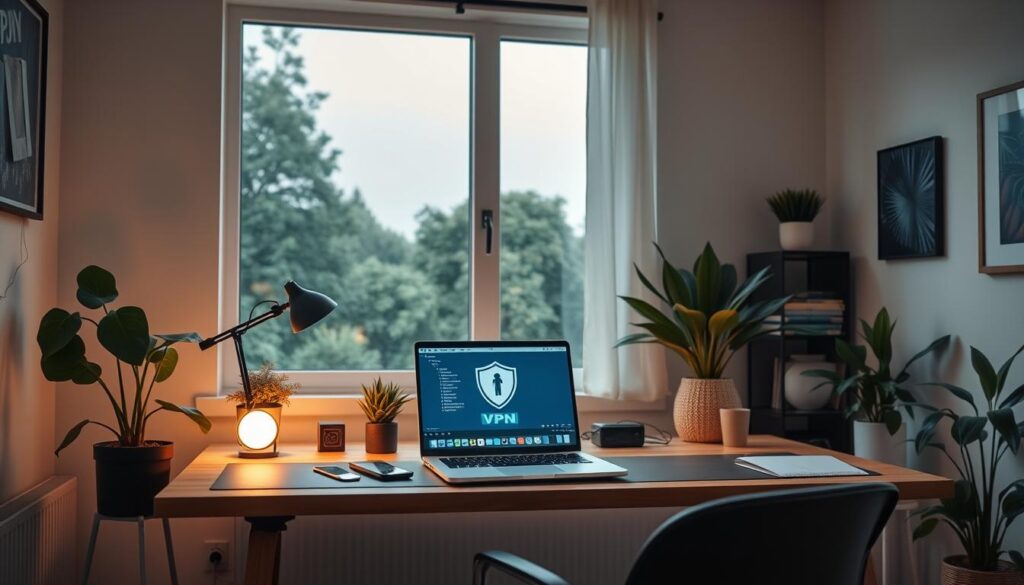
“A VPN is no longer a luxury for remote workers – it’s a necessity. It’s the key to unlocking secure and productive remote access in today’s distributed work environment.”
Common VPN Myths and Misconceptions
VPN use is on the rise, but myths and misconceptions still surround them. I’ll clear up some common misunderstandings about VPNs. This will help you understand how they protect your online privacy, improve your internet security, and keep your data safe.
Many think VPNs slow down your internet. It’s true, a VPN might slightly slow things down. But, top VPN providers use new tech to keep speeds fast. So, you can browse without feeling like it’s slow.
Some believe VPNs make you completely anonymous online. VPNs do help keep your online activities private by hiding your IP and encrypting your data. Yet, your ISP might still know you’re using a VPN. And, some actions, like logging into accounts, can still be traced back to you.
Lastly, some think VPNs protect against all online threats, like malware and phishing. While VPNs are key for data protection and security, they’re not enough on their own. You also need antivirus software, firewalls, and to be careful of scams. A mix of security measures is best for keeping you safe online.
By knowing and debunking these myths, you can use VPNs wisely. This way, you can boost your online privacy and security.
Conclusion
Using a reliable VPN is key to keeping your online life safe. It encrypts your internet, lets you access blocked sites, and keeps your data safe. This way, you can surf the web with confidence and freedom.
As I’ve shown, VPNs offer many benefits. They boost your internet security, protect your data, and keep you safe online. They’re great for accessing blocked content, keeping your internet free, or working remotely safely.
I suggest checking out VPN options and adding them to your online safety plan. Doing this makes your online time safer, more private, and empowering. Let’s keep our online privacy strong and control our digital world.
FAQ
What is a VPN and how does it work?
A VPN, or Virtual Private Network, creates a secure internet connection. It hides your IP address and encrypts your online activities. This makes it hard for anyone to trace your online activities or access your sensitive information.
Why should I use a VPN?
There are many reasons to use a VPN: – It protects your online privacy by hiding your IP address and encrypting your internet traffic. – It lets you bypass geo-restrictions and access content blocked in your region. – It secures your internet connection, especially on public Wi-Fi networks. – It enables secure remote access to corporate resources when working from home or on the go.
How does a VPN encrypt my internet traffic?
A VPN uses encryption protocols to secure your internet traffic. Common encryption methods include AES, OpenVPN, and IKEv2. These protocols convert your data into a coded format. Only authorized parties with the correct decryption keys can access it, keeping your online activities private and secure.
What factors should I consider when choosing a VPN provider?
When choosing a VPN provider, consider these factors: – Logging policy: Make sure the provider has a strict no-logs policy. – Server locations: Look for a provider with many server locations to access content from different regions. – Connection speed: Choose a provider with fast and reliable internet speeds. – Encryption protocols: Opt for a VPN that uses strong encryption methods to secure your data. – Customer support: Evaluate the provider’s customer service and technical support options.
How do I set up and use a VPN?
Setting up and using a VPN is easy: 1. Choose a reputable VPN provider and sign up for their service. 2. Download and install the VPN software on your device. 3. Connect to a VPN server of your choice. 4. Once connected, your internet traffic will be routed through the VPN, protecting your online activities.
What are the risks of not using a VPN?
Not using a VPN can expose you to many risks: – Online threats like identity theft, data breaches, and cyber-attacks. – Surveillance and monitoring of your internet activities by your internet service provider, government agencies, or hackers. – Inability to access content or websites blocked or restricted in your region. – Vulnerability to eavesdropping and data theft when using public Wi-Fi networks.
Can a VPN slow down my internet speed?
A VPN can slightly slow down your internet speed due to encryption and routing. However, a reliable VPN provider should minimize this impact. Many factors can affect your internet speed, such as your location, network congestion, and the distance to the VPN server. Choosing a VPN with a wide network of servers and optimizing your VPN settings can help ensure minimal speed reduction.